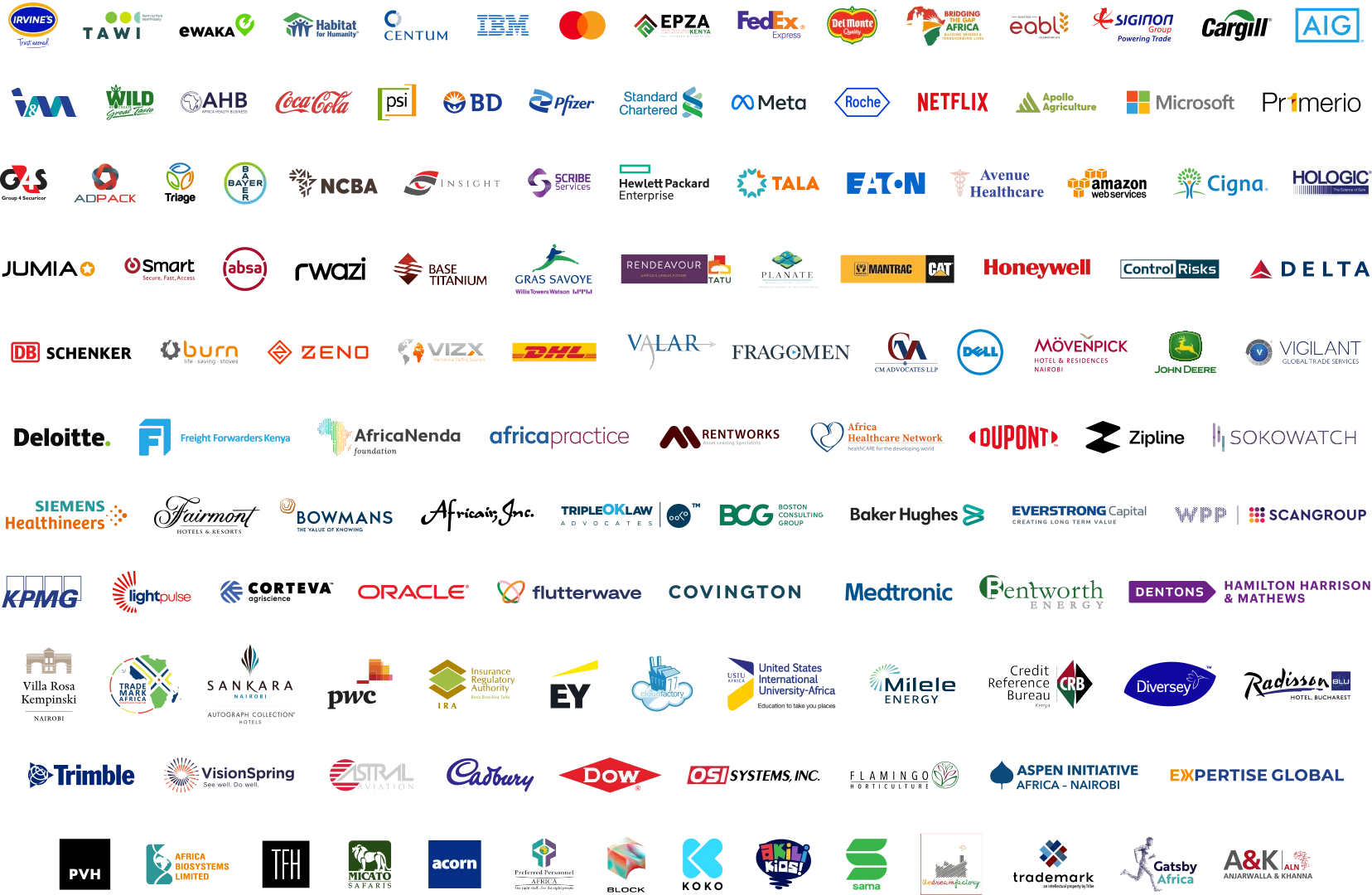By Kenyan Wallstreet and Mwakaneno Gakweli
Published August 3, 2020
Following the ongoing negotiations trade negotiations between the United States and Kenya, The Kenyan Wallstreet interviewed American Chambers of Commerce (AMCHAM) Kenya CEO Maxwell Okello on what this historic Free Trade Agreement means for both countries. In the interview, Maxwell talks about milestones in trade between Kenya and the US, the role of the Free Trade Agreement in enhancing business between the two countries, and how companies could position themselves take up opportunities in the agreement.
What are some of the Milestones in Bilateral Trade Between Kenya and the US?
According to data from AidDATA, the US provides an estimated $3 billion a year in benefits, both commercially and in social engagement. Out of the $3 billion, $1 billion comes from commercial activities between the two countries. Kenya has increased its export revenues from the US by over 285% with trade between the two countries crossing the $1 billion mark last year.
American companies invest $300 million in Kenya, creating over 1,000 jobs each year since 2015. There are other milestones like in tourism where the US is the largest source outside of East Africa, accounting for approximately $190 million in annual revenues to Kenya.
Kenya received $2.5 billion in diaspora remittances, mostly from the US.
Kenya’s relationship with the US is now being elevated to more of a strategic partner, making Kenya integral to the US’s plan with Africa, which is why we arrived at the FTA negotiation.
Why The Transition From aid to Trade?
The shift from providing assistance to a more commercial, private sector-led relationship is a policy change across the globe. Globally, developed countries are looking to build sustainable relationships with developing countries to enhance self-reliance, with the US at the forefront of this course. We want to be self-reliant, and we do need support in the process. In the end, the idea is to have access support instead of seeking lifelines. The FTA is about the US and Kenya providing a platform that allows for unfettered trade and investment to create the transformation for our country and the US as well. This transition is essential for both countries because both nations want to grow and create opportunities for their citizens.
How is COVID-19 Shaping US-Kenya Trade and How will it Affect the FTA Negotiations?
The COVID-19 pandemic has negatively impacted trade across the board. April seemed to be the peak of severe disruptions, as airlines shut down and demand collapsed across various sectors. Businesses like PVH who manufacture from Athi River had to repurpose their manufacturing to PPE after the apparel market collapsed in the US.
The COVID situation had a severe impact on trade value chains and supply chain too. Goods could not move in and out of the country as efficiently as they used to before. For example, the US is an essential source market of second-hand clothing, and the suspension of imports has severely affected individuals who rely on mitumba trade.
One of the interesting lessons is that you cannot concentrate your sourcing too much in one place. China has been for the, a long time, been the world’s manufacturer. When china was locked down, the world almost came to a standstill. The realisation has created an opportunity for countries like Kenya to position themselves as a destination for companies who want to relocate their manufacturing.
The COVID-19 situation has also created an impetus for the Free Trade Agreement, as both countries need to recover. An instrument like the Free Trade Agreement makes it easier for commercial engagement to increase.
The two governments also had to find ways to get through the negotiations virtually, hoping for a face to face discussion later.
How are firms in Kenya and the US working together to enhance trade Post COVID?
From a commercial standpoint, businesses from both sides are looking for opportunities to engage and create value despite the pandemic.
The pandemic has scaled and diversified both inbound and outbound supply chains. PVH, for example, is now providing PPE equipment for Kenya and the region during the crisis. The company mainly relies on local supply chain and distribution networks which, because of the pandemic, have come into sharp focus to make sure that masks and other equipment reach all corners.
SMEs from both countries looking beyond their environment will now diversify their investment and trading environment to protect themselves from risks from this pandemic and any other shock in the future. This gives local SMEs a chance to partner with American counterparts to create value.
The fact that technology is becoming centre-stage and the digital economy is the future gives Kenya an opportunity, given its tech leadership in Africa. Kenya can step up and take advantage of the right partnerships to trailblaze this space for Herself and the rest of Africa.
We also see opportunities such as capital flow and investments that will come post-COVID as companies look at recovering, and where to get best returns. The best returns are within our region and not necessarily the US and Europe.
From a government perspective, the US has announced that it will provide $27.8 million to ensure that small businesses can stay afloat and support the agriculture sector. This will complement the Kenyan governments’ credit guarantee.
I believe that the private sector will be able to drive how they can engage and support trade between the two countries to recover post-COVID.
How Will the Free Trade Agreement Maintain and Grow the Successes of the AGOA?
African Growth and Opportunity Act (AGOA) has done well for Kenya. 70% of trade between the US and Kenya is under the AGOA regime. Textiles and apparel contribute to 70% of the trade while other products like coffee, nuts and tea contribute to having contributed KSh 56 billion worth of trade to the US.
The Free Trade Agreement is looking to offer an “AGOA Plus” arrangement. Unlike AGOA, this Free Trade Agreement is not timebound, which provides more long-term predictability. The Free Trade Agreement creates longterm rules of commercial engagement between the two countries, which drives long term economic growth and progression.
The Free Trade Agreement will enhance inbound trade from the US and expand exports. It will also provide chances for local companies to invest in the US, allowing local players to sell their products in the US.
The Kenyan Free Trade Agreement is more than just about Kenya. It is about the region and Africa, setting the standard for how the US will engage East Africa and the rest of Africa under the African Continental Free Trade Agreement (AfCFTA). It will also provide an opportunity for other countries to come in and use the Free Trade Agreement to engage other countries, setting up bases in Kenya to fly items like fresh food foodstuffs to the US through our direct flights.
How will the US Free Trade Agreement Compliment Other Trade Policies in EAC and Africa?
Rules of engagement in the East African Community (EAC) do not stop member states from engaging in a bilateral agreement with other countries outside the EAC. The same rules apply for AfCFTA as long as the benefits are bound to accrue to the rest of the parties in the trading block.
The EAC stands to benefit with the work that Kenya is doing in this Free Trade Agreement. Further, the US is looking at Kenya as a hub for the East African region. What Kenya is doing is complimentary for the EAC, providing the blueprint to which other countries can use to engage the US.
Kenya’s specific issue was discussed at AU, and the country received a go-ahead to engage the US in these negotiations.
“One of the key things in Kenya’s objectives is that the agreement with the US will and should pay fidelity with the regional agreement at EAC level and with the AfCFTA.”
What does the Free Trade Agreement mean for Local SMEs and MSMEs?
Businesses in the country will benefit from increased market access trade opportunities, accessing higher paying and higher standard consumers in the US through exports. SMEs will also diversify their supply chain, producing goods for the American markets, besides becoming distributors American products locally. The opportunities will come training and exchanges with US companies, which could create an ecosystem for skill and knowledge exchange at company, industry and ecosystem levels.
Local companies will also benefit from knowledge and technology transfer from more established American companies, boosting the quality of local goods and services.
The Free Trade Agreement hails the protection of Intellectual Property rights, which will help local ideas and technologies benefit from higher levels of protection, and therefore offering a better chance at monetisation.
SMEs also stand to gain from direct investment and catalytic capital flows, as well as more partnership opportunities. Companies can align with market opportunities in the US for local goods and services.
Some of the sectors which will benefit include consumer goods, industrial goods, legal services, franchising, energy, IT, digital trade, among others.
Do you think the FTA negotiations will shape other trade talks like the Kenya and UK post-Brexit trade?
The results of the Free Trade Agreement negotiations will impact any future talks on the continent, not only in Kenya alone. The Free Trade Agreement is a more formal, comprehensive and longer-term agreement than any other Kenya has ever engaged in with a developed country and will set the stage and serve as a model for future agreements.
Indeed, we are aware that several African countries are eagerly awaiting the results of the negotiations because this will serve as a model for US bilateral trade engagement, not just with Kenya but with the rest of Africa and is therefore complementary to the AfCFTA.
What is the Role of AMCHAM in Making Kenyan Businesses More Visible in the US?
There several things we focus on at AMCHAM. One of our core mandates as AMCHAM is trade and investments. Under trade and investments, what we do is the direct promotion of opportunities both in Kenya and in the US together with the governments. We have had forums in the US, where we engage with the private sector in the US and pitch opportunities available in Kenya. We do similar activities in Kenya.
In early March, we had a delegation of nine companies in engineering, health, FMCG, construction and production from the Us. These companies were looking for partnerships with local companies to get into the Kenyan market, as well as opportunities for joint venture engagements.
Our work is to profile Kenyan companies and match them to American companies looking for partners to form commercial engagements. We later keep track of the progress of the partnerships. Apart from the direct market linkages and promoting Kenya as an investment destination, we also bridge Kenyan and American companies with the governments to advocate for favourable investment operational climate through the AMCHAM business summit.
Source: Kenyan Wallstreet







